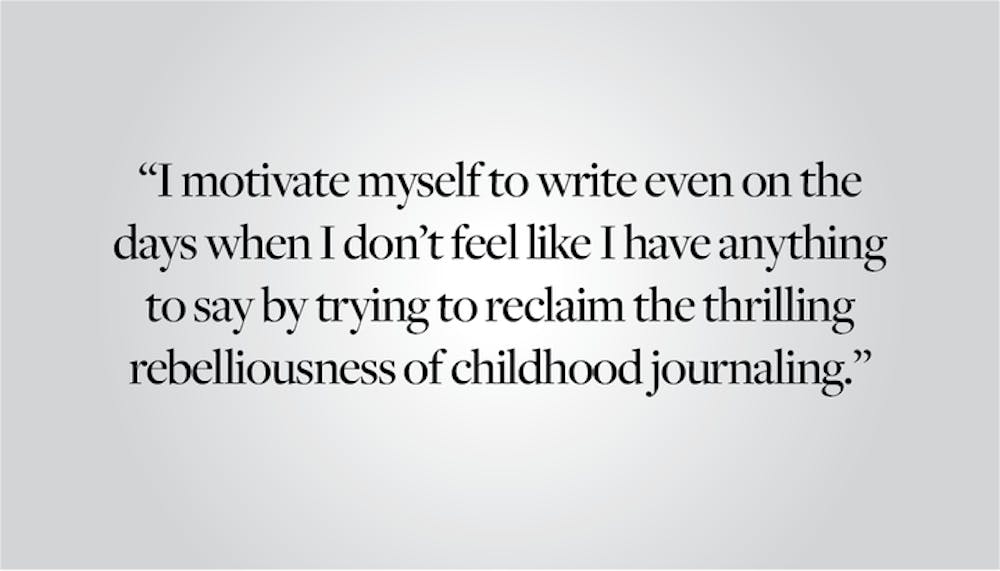When I was eight, my sister bought me a notebook I’d been asking for on the condition that I write a diary entry in it every day. At first, the ideal of cool teenagers writing in pink diaries with ostentatious pens motivated me to keep up the practice. But despite the positive impact of journaling in my daily life, I quickly deemed the practice too tedious to continue into adulthood. Consequently, by dropping journaling when the going got tough, I lost the valuable habit. Keeping a diary has been shown to improve overall well-being by assuaging anxiety and depressive symptoms. In my attempts to pick up the pen again as an adult, I’ve found two methods to be especially helpful for me: expressive writing and gratitude journaling. We should emulate the childhood whimsy of journaling as adults in order to take full advantage of its mental health benefits.
Bottling up emotions can cause negative thoughts to persist throughout the day, but sometimes sharing inner struggles with others can feel impossible. Fortunately, writing about one’s struggles can improve mental health. Journaling provides privacy for people to express themselves in ways they may not feel comfortable doing with others, reducing long-term stress. For me, writing my internal experiences down makes them tangible, and thus something that can be contained under the cover of my notebook.
Expressive writing is a form of journaling that involves recounting upsetting and traumatic events and has been found to decrease psychological distress in undergraduate students, especially among those with elevated stress levels. On top of managing anxiety, expressive writing can help reduce depressive symptoms in people with major depressive disorder.
Many other forms of journaling can also benefit mental health. Even though I was skeptical when my therapist told me to start a gratitude journal, I found that it actually improved my outlook on life. And in a study of female-identifying college students, gratitude journaling was shown to significantly increase gratitude, reduce depressive symptoms and guard against mild depression.
As graduation approaches, I’ve become increasingly stressed about the uncertainty ahead. Keeping a diary allows me to take back control by making my emotions tangible. Yet, despite all the positive effects of journaling, I certainly struggled to pick up the practice again in adulthood.
As a kid, diaries had an air of rebellion to them. They were something to be hidden away from siblings and parents. They came in vibrant pink boxes with voice password protection — yes, I did own the iconic “My Password Journal,” and yes, I do miss it. They offered a space to confess crushes and angst and profound elementary school musings about the world.
But as an adult, what are my most pressing concerns? The threat of a recession. People I have to email but don’t want to. My childhood. I don’t want to think about any of these things! I am aware of the extensive mental health benefits of journaling, but that isn’t a strong enough motivator for me to consistently write about these worries. Journaling as an adult feels like a chore. Where is the drama and pizzazz of my childhood journaling?
I motivate myself to write even on the days when I don’t feel like I have anything to say by trying to reclaim the thrilling sense of rebellion that childhood journaling evoked. I’ve started to hide my journal even though there’s no risk of someone snooping — sometimes I even bury under my duvet and write using a flashlight. I like to trick myself into thinking that my diary will be recovered by future archeologists and considered a valuable relic for understanding people of the ancient past. This empowers me to view my journaling as an essential task for humankind, not just a frivolous endeavor for myself.
There are many types of journaling. Even if expressive writing or gratitude journaling isn’t for you, journaling regularly can help stimulate creativity, increase productivity and aid self-discovery. If starting a journal feels daunting, find ways that make it fun for you instead of avoiding it altogether.
Today, I keep one journal for expressive writing in an undisclosed location, and I carry a pocket-sized gratitude journal with me. While they have by no means solved all my problems, writing in these journals makes me feel lighter and more capable to face what’s ahead.
Megan Slusarewicz ’23 can be reached at megan_slusarewicz@brown.edu. Please send responses to this opinion to letters@browndailyherald.com and other op-eds to opinions@browndailyherald.com.





